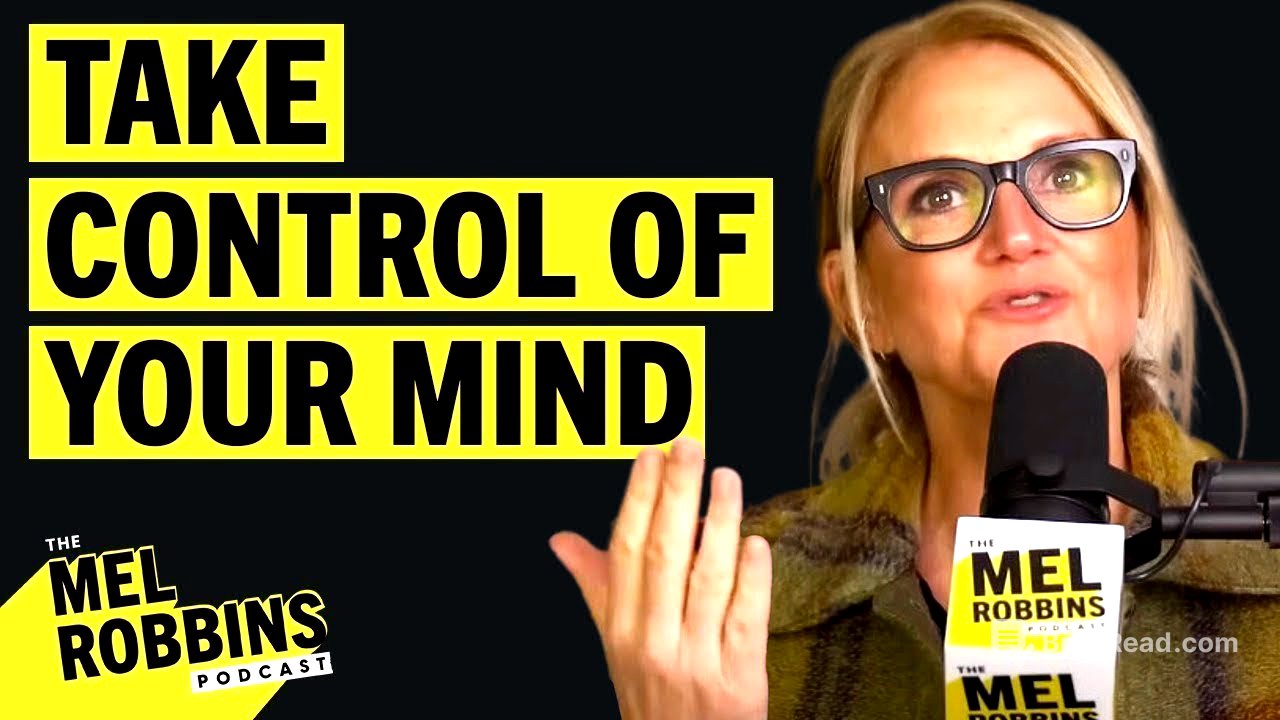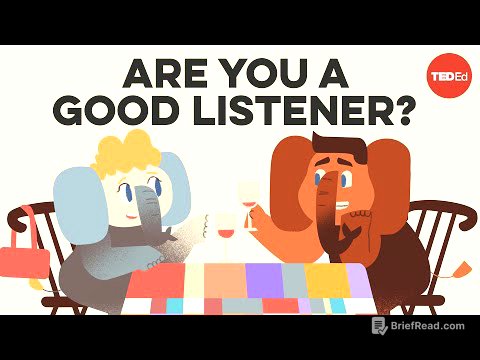TLDR;
This episode of the Mel Robbins Podcast focuses on understanding and reprogramming your mindset to work for you, rather than against you. Mel introduces the concept of mindset as a filter through which we view the world, using the metaphor of sunglasses. She explains how our beliefs and opinions shape our perception and influence our actions. The reticular activating system (RAS), a filter in the brain, is discussed as a key component in determining what information we consciously perceive. Mel provides practical exercises, such as "looking for hearts," and cognitive bias modification techniques to help listeners reset their mindset, overcome self-doubt, and train their brains to focus on the positive.
- Mindset is a filter that shapes how you view the world and influences your actions.
- The reticular activating system (RAS) is a filter in your brain that can be programmed to focus on what you want to see.
- Practical exercises and cognitive bias modification can help reset your mindset and overcome negativity.
Intro [0:00]
Mel Robbins introduces the topic of mindset, emphasizing that your mind is either working for you or against you. The goal of the episode is to provide listeners with tools and knowledge to make their minds work for them, whether they struggle with overthinking or want to level up their positive outlook. Mel thanks listeners for voting the Mel Robbins podcast as the most inspirational podcast of 2022. She highlights that the podcast is a conversation between her and the listeners, and it's changing lives by inspiring and empowering people around the world.
What does “mindset” even mean? [6:05]
Mel defines mindset as your beliefs and opinions about how the world works, using the metaphor of sunglasses to illustrate how mindset filters your perception. Just as sunglasses tint your view, your mindset colors and filters your experiences. Pessimistic mindsets skew the world negatively, while optimistic mindsets make everything appear brighter. People with negative mindsets often don't realize they have their "glasses" on, while those with can-do attitudes see possibilities and assume good intent. A study from the University of Toronto shows that wearing rose-colored glasses improves mood and expands visual horizon.
The truth about why mindset matters. [11:30]
Mindset shapes how you view the world, determining your thoughts, feelings, and actions. It impacts your perception of the present, past, and future, and influences how you see other people. A negative mindset can limit your potential, while a positive mindset can expand it. With the right attitude and consistent action, you can change aspects of your life for the better. A negative mindset can keep you stuck, while a brighter mindset inspires action.
Is your mindset keeping you trapped? [14:26]
Mel emphasizes that the conversation is about training your mind to work for you, not about toxic positivity. It's about strategically training your mind to have a more optimistic and empowered attitude. This enables you to believe in your ability to overcome challenges, such as debt. By removing "dark glasses," you can see that you're not stuck and can find different options. Even in difficult situations like discrimination or poverty, you can train yourself to decide how to react and respond, empowering you to face, deal with, and survive these challenges.
Is this just toxic positivity? [15:32]
Mel clarifies that training your mind is not about positive thinking or putting a positive spin on negative situations. It's about strategically training your mind to have a more optimistic and empowered attitude. This enables you to believe in your ability to overcome challenges, such as debt. By removing "dark glasses," you can see that you're not stuck and can find different options. Even in difficult situations like discrimination or poverty, you can train yourself to decide how to react and respond, empowering you to face, deal with, and survive these challenges.
Your brain has a filter. And if you’re not programming it, it’s probably working against you. [25:25]
Mel illustrates the flexibility of the mind with the example of buying a new car. Once you become interested in a specific car model, you suddenly start seeing it everywhere. This demonstrates that your mind is changing in real-time, paying attention to what it thinks you are excited about or interested in. The cars were always there, but you didn't notice them because they weren't important to you. This proves that your brain wiring is changing in real-time.
Understanding your reticular activating system [34:43]
Mel introduces the reticular activating system (RAS), a filter in your mind that determines what information enters your conscious mind. The RAS acts like a bouncer, deciding who gets in based on what's important to you. It prevents information overload by blocking out irrelevant details. The RAS programs what comes into your conscious mind based on what it thinks is important to you. By intentionally telling the bouncer what you want to see, the RAS reprograms itself in real-time to help you see those things.
How to beat self-doubt. [39:05]
Mel explains how self-doubt can program the filter in your brain. If you spend a lot of energy doubting yourself, your RAS thinks it's important to see what's wrong, blocking out the things you do right. This creates a self-fulfilling prophecy where you only focus on your mistakes. However, if you intentionally search for reasons to feel proud, your mind will start showing you the good things you've done. This ties into the power of gratitude, which trains the RAS to focus on positive aspects.
How mindset fuses to your RAS [43:50]
Mel explains how mindset and the filter in your brain get linked and fused together. It starts with negative thoughts, and then your filter gets involved, leading you to see more and more reasons to doubt yourself. Your brain isn't working against you; it's responding to where your mindset and energy are going. By getting intentional about searching for reasons to feel proud, your mind will start showing you the good things you've done instead of the one thing you did wrong.
Why you’re not meeting that special someone. [47:08]
Mel uses the example of a single person desperate to meet someone to illustrate how mindset affects the filter in your brain. The more energy you put into a negative narrative, the more your brain filters the world to reinforce that negative story. This explains why a friend might see the opposite and try to encourage you, but because of your different mindsets, you see the situation through a different lens. The filter in your brain can either make the situation worse or better, depending on your ability to program it.
The fun and simple brain game I play with my daughters. [54:27]
Mel introduces an exercise called "looking for hearts" to train your mind. Every day, you go on a scavenger hunt to find naturally occurring heart shapes. This isn't just about finding hearts; it's about telling your mind what to focus on. When you see a heart, pause, stare at it, and savor the moment, rewarding your brain for being flexible. This helps you realize that your brain is trying to help you and that it's possible to change the way you think.
How to overcome to the fear of making things better for yourself [1:00:57]
Mel addresses the fear of making things better, explaining that it's common to feel nervous when glimpsing how things could be different. She emphasizes that this isn't about hope but about hard science. The negativity in your mind is often outdated programming from others, like parents or caregivers. By changing the filter, you can see reasons to be happy and pay attention to people who make you feel great.
The simple mindset flip that will change your life [1:07:37]
Mel introduces the concept of a substitution diet for negative thoughts, using cognitive bias modification. Instead of obsessing over what could go wrong, ask "what if it works out?" This simple switch can lead to feeling more encouraged and motivated. Your brain pays attention to what's important to you, so by prioritizing positive thoughts, you can see an entirely new world of possibilities.
I want this for you. [1:15:59]
Mel shares that she wants listeners to reclaim their experience of life and see all the places where they can go and all the magic they have to give. She believes everyone struggles with feeling "not good enough" due to childhood experiences. The opportunity in adult life is to reclaim your experience and focus on your strengths. Mel encourages listeners to search for hearts, ask "what if it all works out," and remember that they are a work in progress. She emphasizes that even though she teaches this stuff, she also needs to put it into practice and catch herself when negativity starts.









